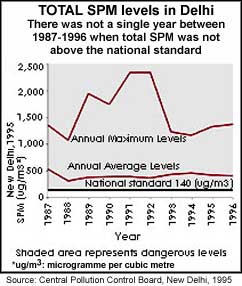Fatal Attraction
 Hell on wheels
Hell on wheels
Dieselmania hits the Indian private automobile sector. And why not? Diesel is cheaper than petrol, and car loans are available in plenty
it's sleek , it's mean, it races, it is not an aircraft. It runs on diesel. Some of them even run on petrol. The automobile industry has today become the victim of its own success and so has the successful urban professional. As cars crawl through a haze of smoke in the metro, few realise how they are paying for this success with their health.
Delhi has the largest market for cars in India and, since 1987, the annual rate of increase of cars in the city has even outpaced two-wheelers. The average annual rate of increase of cars from 1995-96 to 1997-98 was about 10 per cent, as opposed to 7 per cent in case of two-wheelers. Using these growth rates to project the future car population, by 2009-2010, we get a total car population of 2.39 million, thrice the number of cars registered by March 31, 1998. Assuming that 25-50 per cent of this increase is going to be diesel cars, by March 31, 2010 Delhi's car population could equal to the entire number of cars registered today. In other words, more than 800,000 new diesel vehicles could be plying in Delhi by 2010.
Parminder Singh, a computer engineer with a multinational company, is suffering from chronic chest pain and coughing. He agrees that pollution in Delhi has risen dramatically during the last two decades and that his health bill has shot up. To make up for his health costs, he has decided to curb other expenses. One of which is switching from petrol to diesel, a cheaper fuel, to run his car. "My car consumes a lot of petrol during a jam,' he says, after a bout of coughing. Little does he know that as the number of diesel cars in the jam grows, his cough will only get worse. Unfortunately, no car salesman has told him that.
S L Bhatt, joint secretary, department of science and technology, New Delhi, drives a Maruti 800. As a second car, he has chosen Telco's Indica Mint (diesel). "Besides the fact that it is based on Indian technology, I have placed an order for the car mainly keeping the fuel efficiency in mind,' he says.
Bhatt is among the 60,000 people who have booked an Indica. According to Tata Concord, an automobile agent in Connaught Place, New Delhi, in the first round of booking, there were 115,000 applications, of which 60,000 were actually booked. Of these, 15,000 were from Delhi alone. Over 90 per cent of all the orders booked were for diesel cars.
The other car manufacturers racing ahead with diesel cars include Premier Automobile Ltd's Fiat Uno, Mahindra-Ford's diesel Escort and Mercedes-Benz India Ltd's diesel variant of E250. Besides, General Motors and Hindustan Motors-Mitsubishi joint venture are ready with their diesel Astra and Lancer respectively. Even the public sector, Maruti Udyog Ltd has not been able to restrain itself from entering the diesel car race. It has already rushed in with the diesel Zen and has announced more diesel versions of their existing models like the Esteem in the near future. The trend towards dieselisation of the private vehicular fleet has grown rapidly over the last few years, and is extremely worrying for a variety of reasons, including the fact that diesel emissions are carcinogenic and it negates the Supreme Court order to keep a check on vehicular pollution in Delhi.
The sole factor responsible for the overwhelming demand in diesel cars is the low running cost, at times comparable with that of a scooter. And advertising agencies are promoting them in a big way. Says Indronil of Lintas, responsible for the print media ad for Maruti's diesel Zen model, "We have made the ad keeping all the Zen values, including diesel, in mind...' And what are the diesel values? "That it is less polluting than petrol,' he says, unsure of whether the company had given him that brief or it is personal opinion.
Despite the confusion prevailing in the adman's mind, there is no ambiguity in the car-purchaser's. Gone are the days when diesel-run vehicles were treated as objects of contempt: noisy, unsightly, behemoths. All you need to do is "surprise yourself at the nearest dealer'. Metallic reds, blues and silver colours add to the hype surrounding diesel cars.
If the price tag disappoints, there are several "buy now, pay later' options to the rescue. Low payouts (monthly instalments) and loans for longer durations make owning a car much easier. For instance, leading financiers like Tata Finance, Industrial Credit and Investment Corporation of India and Hong Kong Bank offer loans for a maximum of seven or eight years. This translates into people buying more cars at monthly instalments of around Rs 2,000 to Rs 5,000, a small price to pay to satisfy the aspirations of a would-be car owner.
The growth in diesel-powered three wheelers and two-wheelers is no less alarming. Crompton and Greaves rolled out their diesel three-wheeler, Garuda, in 1996 while Bajaj Auto Limited, afraid of losing its market share, has developed a diesel model of its three-wheeler. Besides, there are a host of other diesel-run three-wheeler manufacturers already in operation for a long time. Some of them include Scooters India, Lucknow, manufacturer of the widely-used Vikram three-wheeler; Kerala Auto, Kerala, which manufactures a six-seater auto; and Atul Auto, Gujarat.
This trend is being encouraged by the enormous difference in petrol and diesel prices
Related Content
- Order of the National Green Tribunal regarding large scale felling of toddy yielding palm trees in Bihar, 05/06/2025
- Delhi tops the country in fatal road accidents and in number of pedestrians and cyclists falling victim, says new CSE assessment
- Mangrove nightmare
- Saving the Olive Ridley
- Radiation talk
- Pills that kill
